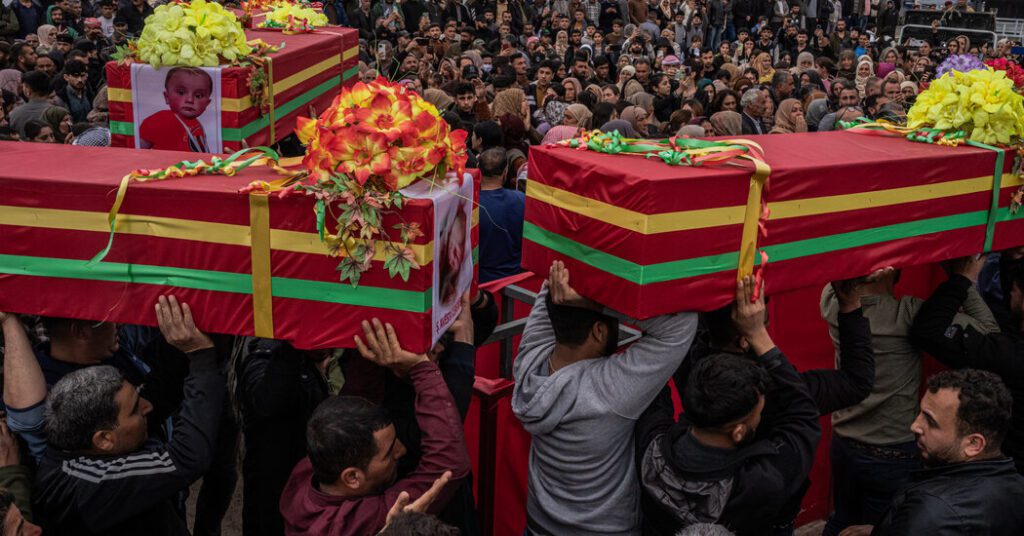Kurdish Integration into Syria’s National Military: Challenges and Perspectives
The Context of Kurdish Forces in Syria
In the wake of the rebel forces’ takeover in Syria, efforts have been made to unify the country’s diverse armed groups into a centralized national army. A focal point in these efforts lies in northeastern Syria, an area predominantly governed by the Kurdish minority, where historical mistrust of new leadership prevails.
Historical Tensions and Current Alliances
Traditionally, the rebels and Kurdish groups have been adversaries. However, with the rebels now in positions of authority, talks have commenced to forge alliances and amalgamate the Kurdish-led military into the national force. Despite the potential for unity, skepticism regarding this new government, which has associations with Turkey, remains prevalent among Kurds.
“How can we trust this new government in Damascus?” asked Amina Mahmoud, a Kurdish resident of Kobani.
Negotiations and Military Integration
On March 10, the Kurdish-led Syrian Democratic Forces (S.D.F.) reached an agreement to integrate their military structures and resources under the Syrian government’s control by year’s end. This represents a significant advancement for the newly appointed president, Ahmed al-Shara, aiming to stabilize a country still affected by instability.
Furthermore, discussions are ongoing regarding the specific terms of integration, such as whether the S.D.F. will enter the national military as a comprehensive unit or maintain a continued role in securing northeastern territories.
“Al-Shara and the new government want to control all of Syria,” cautioned Badran Kurdi, a Kurdish political representative. “And of course they are dreaming about controlling all of our areas. But it’s very difficult.”
Local Reactions and Doubts
While the initial reactions in the northeast were optimistic, concerns soon arose regarding the implementation of the agreement. The Kurdish population, comprising approximately 10% of Syria’s demographics, has expressed fears about the future of their rights and security, doubting that they will be represented equally under the new governance framework.
Ali Ahmed, a chemistry teacher from Hasakah, has expressed this sentiment vehemently, labeling al-Shara as a “terrorist” due to his past affiliations with Al-Qaeda.
“We know him,” Ahmed remarked, alluding to al-Shara’s leadership in the Nusra Front during conflict with the S.D.F.
The Role of Turkey and Regional Security Concerns
Turkey’s involvement adds another layer of complexity. Considered a hostile entity by many Kurds, Turkey has conducted operations against Kurdish fighters, linking them to militants within its borders. Recent Turkish military actions continue to create an environment of fear and uncertainty for Kurdish communities, especially after an airstrike in March claimed civilian lives in Kobani.
“What have we done?” lamented Amina Mahmoud, reflecting on the devastation from the Turkish strikes.
Minority Perspectives: Fear and Hope
Different ethnic and religious minorities in northeastern Syria share varying degrees of apprehension regarding the integration of Kurdish forces into the state military. For instance, Christians in the region have expressed distinct concerns over potential reprisals if Kurdish leadership diminishes. Alis Marderos, an Armenian Christian, emphasized the vital role of Kurds in maintaining local security.
“If the Kurds did not exist here, we would have been beheaded,” she asserted.
Arab Perspectives: Division and Support
Arab residents have mixed feelings regarding the situation. Some see the integration agreement as a necessary check on Kurdish dominance, while others appreciate the stability that the S.D.F. has brought. Sheikh Hassan al Muslat al-Milhim, an Arab Syrian from Hasakah, voiced concern over the Kurdish forces’ influence, citing the controversial support from the United States.
“We the Arabs, up until this moment, do not like having the Americans here,” he stated.
Conclusion: A Fragile Path Forward
This complex tapestry of alliances, distrust, and hope continues to evolve following the agreement between Kurdish forces and the central government. The fate of northeastern Syria hangs in a precarious balance, as the integration discussions play out against a backdrop of heightened tensions and historical grievances.


